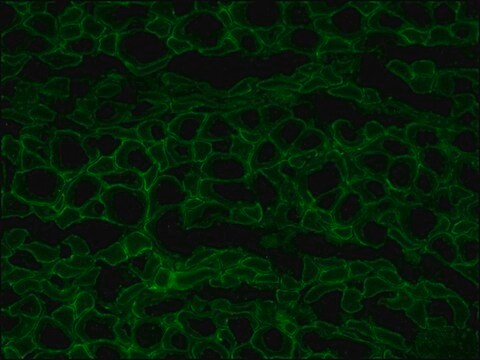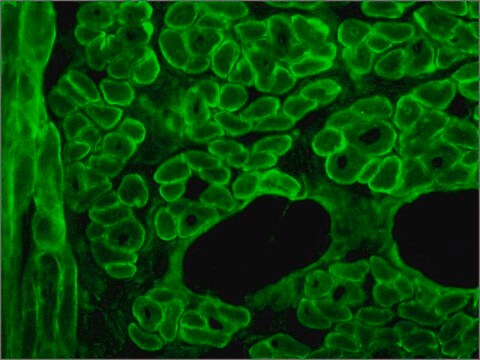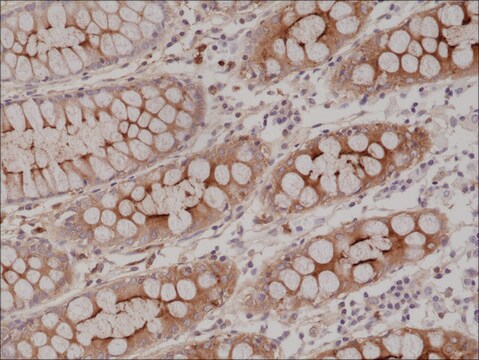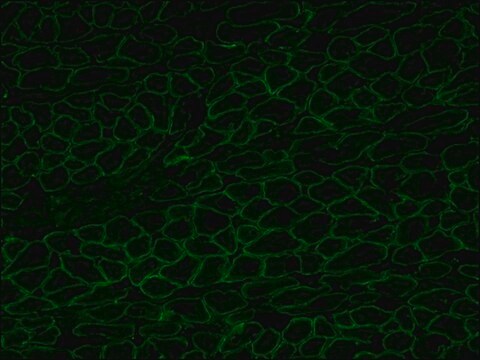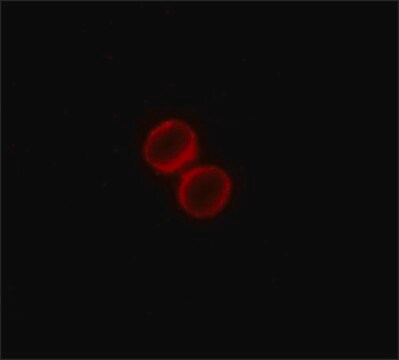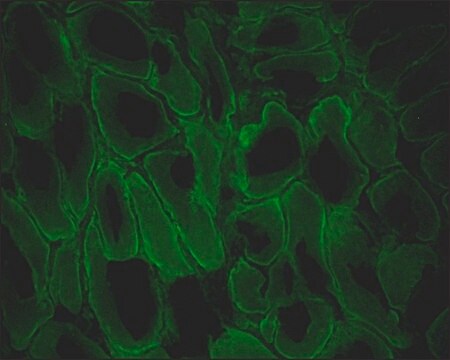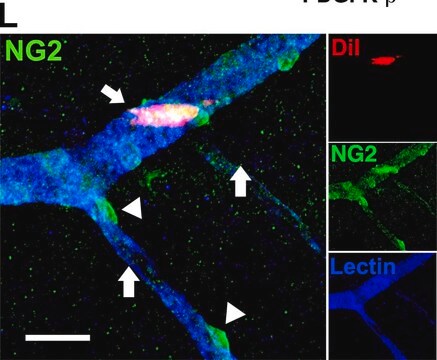おすすめの製品
製品名
Anti-Dystrophin MANEX4850E Antibody, clone 8C5,
由来生物
mouse
品質水準
抗体製品の状態
purified antibody
抗体製品タイプ
primary antibodies
クローン
8C5, monoclonal
分子量
calculated mol wt 426.75 kDa
observed mol wt ~430 kDa
精製方法
using protein G
化学種の反応性
mouse, human
包装
antibody small pack of 100
テクニック
immunofluorescence: suitable
immunohistochemistry: suitable
western blot: suitable
アイソタイプ
IgG2aκ
エピトープ配列
Internal
タンパク質IDアクセッション番号
UniProtアクセッション番号
保管温度
2-8°C
遺伝子情報
human ... DMD(1756)
特異性
Clone 8C5 is a mouse monoclonal antibody that detects the deletion prone region of Dystrophin. It targets an epitope within 295 amino acids from the internal region.
免疫原
Recombinant human dystrophin fragment corresponding to amino acids 2145-2439 encoded by exons 45-50; as β-galactosidase fusion protein.
アプリケーション
Quality Control Testing
Evaluated by Western Blotting in Human muscle tissue extract.
Western Blotting Analysis: A 1:1,000 dilution of this antibody detected Dystrophin in Human muscle tissue extract, but not in HeLa cell lysate.
Tested Applications
Immunofluorescence Analysis: A representative lot detected Dystrophin in Immunofluorescence applications (Lim, K.R.Q., et al. (2022). Proc Natl Acad Sci USA. 119(9): e2112546119).
Western Blotting Analysis: A representative lot detected Dystrophin in Western Blotting applications (Lim, K.R.Q., et al. (2022). Proc Natl Acad Sci USA. 119(9): e2112546119).
Immunohistochemistry Applications: A representative lot detected Dystrophin in Immunohistochemistry applications (Lim, K.R.Q., et al. (2022). Proc Natl Acad Sci USA. 119(9) e2112546119).
Note: Actual optimal working dilutions must be determined by end user as specimens, and experimental conditions may vary with the end user.
Evaluated by Western Blotting in Human muscle tissue extract.
Western Blotting Analysis: A 1:1,000 dilution of this antibody detected Dystrophin in Human muscle tissue extract, but not in HeLa cell lysate.
Tested Applications
Immunofluorescence Analysis: A representative lot detected Dystrophin in Immunofluorescence applications (Lim, K.R.Q., et al. (2022). Proc Natl Acad Sci USA. 119(9): e2112546119).
Western Blotting Analysis: A representative lot detected Dystrophin in Western Blotting applications (Lim, K.R.Q., et al. (2022). Proc Natl Acad Sci USA. 119(9): e2112546119).
Immunohistochemistry Applications: A representative lot detected Dystrophin in Immunohistochemistry applications (Lim, K.R.Q., et al. (2022). Proc Natl Acad Sci USA. 119(9) e2112546119).
Note: Actual optimal working dilutions must be determined by end user as specimens, and experimental conditions may vary with the end user.
ターゲットの説明
Dystrophin (UniProt: P11532; also known as DMD) is encoded by the DMD gene (Gene ID: 1756) in human. Duchenne muscular dystrophy is caused by mutations in DMD gene. Most subjects have out-of-frame deletions in the DMD gene that leads to lack of dystrophin in muscle. Dystrophin is a rod-shaped cytoplasmic protein and a vital part of a protein complex that connects the cytoskeleton of a muscle fiber to the surrounding extracellular matrix through the cell membrane. It is expressed in muscle fibers accumulating in the costameres of myoplasm at the sarcolemma. Its expression is also reported in brain, muscle, kidney, lung, and testis. Dystrophin is localized to the inner part of the muscle fiber cell membrane (sarcolemma), where it forms the dystrophin-associated glycoprotein complex (DGC) that links the extracellular matrix to the actin cytoskeleton. The N-terminus is the actin-binding domain, and the carboxy-terminal domain interacts with β-dystroglycan as well as dystrobrevin and the syntrophin. The central rod domain that comprises the major mass of the dystrophin molecule forms a flexible, rod-shaped structure. Dystrophin plays an important role in stabilizing the muscle fiber against the mechanical forces of muscle contraction by providing a shock-absorbing connection between the cytoskeleton and the extracellular matrix. The DMD gene is the largest known gene in humans and mutations in this gene are known to cause Duchenne muscular dystrophy, a sex-linked recessive disorder that affects males aged 3 to 7 year as proximal muscle weakness with steady progression. Clone 8C5 is generated from the deletion-prone region of the Duchenne muscular dystrophy gene. MANEX4850E corresponds to exons 48 to 50. Exon skipping studies have shown that phosphorodiamidate morpholino oligomers (PMOs) can convert out of-frame to in-frame mutations, which produce truncated, partially functional dystrophin. Seventeen different isoforms of Dystrophin have been described that are produced by alternative promoter usage and alternative splicing. (Ref.: Lim, KRQ., et al. (2022). Proc. Natl. Acad. Sci. USA. 119(9); e2112546119; Thanh, LT., et al. (1995). Am. J. Med. Genet. 58(2); 177-186).
物理的形状
Purified mouse monoclonal antibody IgG2a in buffer containing 0.1 M Tris-Glycine (pH 7.4), 150 mM NaCl with 0.05% sodium azide.
再構成
1.0 mg/mL. Please refer to guidance on suggested starting dilutions and/or titers per application and sample type.
保管および安定性
Recommended storage: +2°C to +8°C.
その他情報
Concentration: Please refer to the Certificate of Analysis for the lot-specific concentration.
免責事項
Unless otherwise stated in our catalog or other company documentation accompanying the product(s), our products are intended for research use only and are not to be used for any other purpose, which includes but is not limited to, unauthorized commercial uses, in vitro diagnostic uses, ex vivo or in vivo therapeutic uses or any type of consumption or application to humans or animals.
適切な製品が見つかりませんか。
製品選択ツール.をお試しください
保管分類コード
12 - Non Combustible Liquids
WGK
WGK 1
引火点(°F)
Not applicable
引火点(℃)
Not applicable
適用法令
試験研究用途を考慮した関連法令を主に挙げております。化学物質以外については、一部の情報のみ提供しています。 製品を安全かつ合法的に使用することは、使用者の義務です。最新情報により修正される場合があります。WEBの反映には時間を要することがあるため、適宜SDSをご参照ください。
Jan Code
MABT1569-25UG:
MABT1569-100UG:
試験成績書(COA)
製品のロット番号・バッチ番号を入力して、試験成績書(COA) を検索できます。ロット番号・バッチ番号は、製品ラベルに「Lot」または「Batch」に続いて記載されています。
ライフサイエンス、有機合成、材料科学、クロマトグラフィー、分析など、あらゆる分野の研究に経験のあるメンバーがおります。.
製品に関するお問い合わせはこちら(テクニカルサービス)